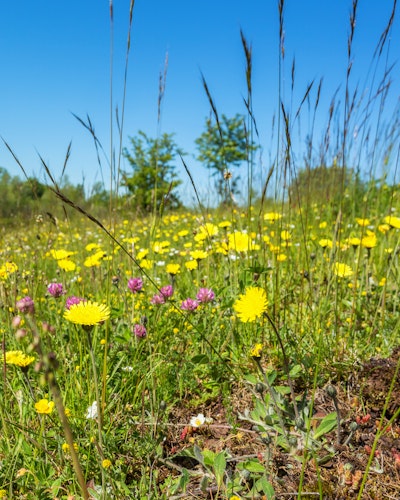Nature’s Best® is ecotourism in practice for responsible companies in nature and cultural tourism as well as for the conscious travelers.
What is Nature’s Best®?
Nature’s Best® is Sweden’s only sustainability label for nature-based experiences. The labeling system labels the activities of ecotourism entrepreneurs. Nature’s Best® functions both as a systematic tool for nature and cultural tourism companies’ sustainable business development and a quality label that makes sustainable experiences visible to conscious travelers.
Ecotourism in practice quite simply.
With quality-assured consideration for nature conservation, environmental adaptation or local anchoring with care for the destination’s cultural values.
Natures Best quality marks Swedish ecotourism companies with an internal set of standards that since 2023 have been recognized by GSTC, the Global Sustainable Tourism Council’s international criteria for sustainable tourism.

What is ecotourism?
“Ecotourism is responsible travel that helps protect natural environments and supports the well – being of the local population” (World Wide Fund for Nature-WWF 1994)
Nature’s Best® six basic criteria reflect the values of ecotourism in practice and each basic criterion in the labeling system consists of a number of underlying criteria that the quality-labeled company meets.
Why Nature’s Best@?
Crucial to the future of tourism is that it develops sustainably. Nature tourism creates the conditions for achieving several sub-goals in Sweden’s continued work with the UN’s global sustainability goals – Agenda 2030. In particular the goals of sustainable consumption and production, to protect ecosystems and biodiversity, and to combat climate change.
Countries and regions create structures and initiatives that promote a development process towards a more sustainable society, where the individual companies participate and take their responsibility through various initiatives. Not sawing off the branch on which nature tourism itself sits will be one of the industry’s major challenges.
When did Nature’s Best start?
In 2002, during the UN’s International Year of Ecotourism, Nature’s Best® was launched, which became one of the first quality labels of ecotourism on earth.
Who stands behind Nature’s Best?
The Swedish Nature & Ecotourism Association (Naturturismföretagen).
What does the labeling system consist of?
The labeling system consists of Nature’s Best 6 Basic Principles, Nature’s Best Thematic Criteria, Nature’s Best Destination Analysis, Nature’s Best Environmental Plan.
What ecotourism experiences can the conscious traveler take part in out in the Swedish nature?
Spectacular eco-accommodation, dog sledding, kayaking, canoeing, hunting, fishing, reindeer herding, skiing, bear safaris, Sami experiences, wolf tracking, bird watching, climbing, reindeer sleigh rides, diving, horseback riding, rafting, rafting, archipelago cruises, snowshoeing, snowmobiling, mountaineering hiking in the mountains with hooves or pack horses – let Nature’s Best® show the way to unforgettable nature and cultural experiences delivered by responsible companies.
(links to landing pages / collection pages for categories and tags?)

Nature’s Best six principles
1: Respect the limitations of the destination – the least possible wear and tear on nature and culture.
Ecotourism is to preserve instead of destroying what the visitor has come to experience. The ecological and cultural viability of each area must be respected.
This requires good knowledge of the destination of the organizer, local presence and close cooperation with other actors.
2: Benefit the local economy – Ecotourism is to anchor tourism locally. Nature conservation easily becomes a blow in the air if the people of the area are against it. Being able to benefit from tourism is often a positive driving force.
Each event must therefore contribute to the destination’s finances – overnight stays in the locality, local guides and locally purchased goods and services. The more the better.
3: Environmentally adapt the entire business – Ecotourism organizers must be at the forefront when it comes to environmental adaptation. Therefore, approved organizers must actively minimize the environmental impact of travel. Among other things, public transport must be encouraged, accommodation facilities adapted to the environment, waste sorted and environmental fuels given priority.
4: Actively contribute to nature and cultural protection – Ecotourism takes its responsibility for biodiversity and unique cultural values. This means supporting nature conservation in various forms in some active way. The ecotourism organizer collaborates with a living nature and cultural protection opinion. A partnership for mutual benefit.
5: Invest in the joy of discovery, knowledge and respect – Ecotourism is to travel with a curious and respectful attitude. Approved organizers are skilled hosts and knowledgeable guides, who offer useful introductions, good advice, guidance and valuable tips. Good hospitality and well-communicated knowledge are often the key to memorable travel experiences.
6: Quality and security on the trip – Ecotourism is quality tourism. Marked arrangements must meet and exceed expectations. Safety is taken seriously and satisfied customers are the rule.
The outside world must know that an approved ecotourism organizer is a reliable partner.
Nature's Best six basic principles

Respect the limitations of the destination
Ecotourism is to preserve instead of destroying what the visitor has come to experience. The ecological and cultural viability of each area must be respected. This requires good knowledge of the destination of the organizer, local presence and close cooperation with other actors.

Benefit the local economy
Ecotourism is to anchor tourism locally. Nature conservation easily becomes a blow in the air if the people of the area are against it. Being able to benefit from tourism is often a positive driving force. Each event must therefore contribute to the destination's finances - overnight stays in the locality, local guides and locally purchased goods and services. The more the better.

Adapt the entire business for the environment.
Ecotourism organizers must be at the forefront when it comes to environmental adaptation. Therefore, approved organizers must actively minimize the environmental impact of travel. Among other things, public transport must be encouraged, accommodation facilities adapted to the environment, waste sorted and environmental fuels given priority.

Contribute actively
Ecotourism takes its responsibility for biodiversity and unique cultural values. This means supporting nature conservation in various forms in some active way. The ecotourism organizer collaborates with a living nature and cultural protection opinion. A partnership for mutual benefit.

Invest in the joy of discovery
Ecotourism is to travel with a curious and respectful attitude. Approved organizers are skilled hosts and knowledgeable guides, who offer useful introductions, good advice, guidance and valuable tips. Good hospitality and well-communicated knowledge are often the key to memorable travel experiences.

Quality and security on the trip
Ecotourism is quality tourism. Marked arrangements must meet and exceed expectations. Safety is taken seriously and satisfied customers are the rule. The outside world must know that an approved ecotourism organizer is a reliable partner.
